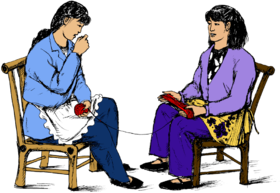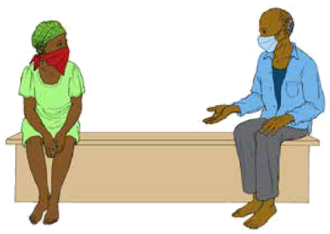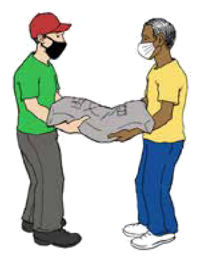Hesperian Health Guides
Coronavirus — COVID-19
Contents
What is COVID-19?
COVID-19 is a disease caused by a virus (coronavirus) that can spread between people. The most common signs of COVID-19 are a dry cough, fever, and body aches. Some people also have shortness of breath and sore throat. COVID-19 mostly affects the respiratory (breathing) system. Most people recover from COVID-19 without needing medical treatment but some become dangerously ill, especially older people and people with certain health conditions (see below). COVID-19 can cause pneumonia (a serious infection of the lungs), can damage the lungs, heart, and kidneys, and in severe cases can lead to death. Some who recover from COVID-19 continue to have health problems for months or years (Long COVID).
Viruses constantly change, leading to different forms of the same virus (variants). New variants of the COVID-19 virus keep developing, and some of these spread faster and more easily than others. Vaccination can help protect you from getting or spreading any of the COVID-19 variants, and there are other ways that you can protect yourself and your community as well.
How does the COVID-19 virus spread?

The COVID-19 virus enters your body through your mouth, nose, and eyes when an infected person breathes, talks, coughs, or sneezes near you. The virus spreads more easily in places with poor ventilation and where people are close together and not wearing masks. So you are more likely to get the COVID-19 virus from others while inside, in a crowd, or with no mask covering your mouth and nose, compared to being outdoors, avoiding large groups of people, and wearing a mask.
Most people start feeling sick within 5 days after getting infected, but the COVID-19 virus can live in the body for 2 to 14 days before signs of illness appear. Some people, especially children, can be infected but have no signs of illness. So people can have the COVID-19 virus and not know it, and can pass the virus to others.
Who does the COVID-19 virus infect?
Anyone can get infected with the COVID-19 virus. People who are vaccinated or who already had it are less likely to get COVID-19, and if they do get it, it is usually less serious. Adults over 60 years old and people with respiratory illnesses, diabetes, heart problems, and weakened immune systems are more likely to become severely ill from COVID-19.

How can you prevent infection?
Getting the most up-to-date COVID-19 vaccine whenever a new one is available is the best protection from COVID-19 infection and serious illness in yourself and others. Because these vaccines are not available in many parts of the world, it is important to take other steps to protect yourself and your community.
- Wear a mask: Wearing a mask makes you less likely to spread the COVID-19 virus if you have it, and less likely to get the virus from people around you. When many people in your community have COVID-19, when you have to be around many people, or when you must be indoors, wearing a mask can protect you from getting COVID-19.
- Wash your hands regularly with soap and water or use alcohol-based hand sanitizer if soap and water are not available. This is especially important when returning home, after using the bathroom, before meals, and after you cough, sneeze, or blow your nose. Avoid touching your face without first cleaning your hands.
- Increase ventilation: Meet up with others outdoors to lessen the amount of virus you come in contact with. If you are indoors, open windows and doors to bring in fresh air.
- If someone in your household gets COVID-19: The sick person should stay home and apart from others in the household as much as possible. Everyone should wear a mask when in the same room.
- Monitor your health: If you have been in close contact with someone who has COVID-19, watch yourself for signs of illness. If you have signs of COVID-19, stay home and away from others and get tested if you can. Use rapid tests if you have them, or check with a health worker about where to get tested. Wear a mask anytime you are around other people.
How is COVID-19 treated?
Most people who get COVID-19 are able to recover at home without medical attention. In these cases, COVID-19 is treated like other illnesses caused by viruses – with rest and drinking enough water, soups, and other fluids, and by treating any pain and fever with paracetamol (acetaminophen) or ibuprofen. Because COVID-19 is caused by a virus, antibiotics will not cure this illness or help people feel better.
In many places, people who have COVID-19 and are likely to become seriously ill (because of age or other health conditions) can take antiviral medicine to help them feel better. These medicines must be started within the first few days after signs of COVID-19 appear. If you have COVID-19, talk to a health worker right away to find out what is available.
The most serious danger from severe COVID-19 illness is inability to breathe. Treatment for severe cases will include oxygen and a mechanical ventilator, available only in health care facilities.



